日语中级口译-4
- 格式:doc
- 大小:85.00 KB
- 文档页数:4

中级口译教程第四版词汇预习汇总(f i n a l)(共36页)--本页仅作为文档封面,使用时请直接删除即可 ----内页可以根据需求调整合适字体及大小 --机场迎宾人力资源经理top-notch能够成行不辞辛苦百忙中抽空run into a storm be held upclear up attending service 倒时差行李齐了下榻宾馆设宴洗尘总裁杂技表演manager of Human Resources 顶尖的make itin spite of the tiring triptake time from busy schedule下了暴雨等待天气转好服务好jet-lagget all the luggagetake to the hotelhost a reception in one's honor Chairmanacrobatic show宾馆入住check-in预定房间确认函travel agency itinerary accommodation 双人间豪华套房8 折优惠价morning call photo-copy express mail总台餐饮部洗烫部楼层服务台fitness exercise 教练登记住宿have a reservationletter of confirmation旅行社行程表住宿double roomdeluxe suiterate with 20% off叫醒复印快递Front DeskCatering ServiceLaundry ServiceFloor Service Desk健身coach宴会招待敬业 dedicatedcontributed one's sharemaneuver 用策略尽自己的责任大自然所赐予的cuisine色、香、味、形调料食物的质地原汁原味appetizing特色点心皮薄汁醇皮脆肉嫩酸甜适口figure out好戏还在后头祝酒干杯Mother Nature grants菜系color, aroma, taste, appearance seasoningraw materials with quality textureoriginal flavors引起食欲special snackthin and translucent wrapper, rich tasty soupcrispy and tender meatsweet and sour想出来have more surprises to expect propose a toast to/drink tocheers参观访问高科技园区业务经理鸟瞰走马观花言归正传项目审批权优惠政策High-Tech ParkOperation Managertake a bird's-eye view ofcast a passing glance at flowers while riding on horsebackcome back to our storyauthorized to approve projectspreferential policies与国际管理体制接轨 under the management system of international standards跨国公司骨干企业生物技术高技术产业链一条龙服务生态型开发可持续发展绿草成茵流水潺潺鸟儿啁啾multinationalslarge enterprises of pillar industries biotechnologyhigh-tech industry chainsa stream-line one-stop service ecological conservation sustainable development stretches of green grassstreams murmuringbirds chirping四季花香安保服务fragrant flowers blossoming all years round security service欢迎光临邮电海外部主任post and telecommunicationdirector of the Overseas Department感到骄傲和荣幸gracious invitationa distinguished groupbe proud and honored 盛情邀请一个杰出的团队寄托 expectation外宾专用别墅 villas for overseas visitorslook over the sea 幽默感字面意思面向大海sense of humor literal meaning下榻国际机票school break live,resideinternational flight ticket学校假期投资意向翻了两番投资热对外全面开放沿海城市内地有利可图I'm all ears to…quadrupleinvestment feveropen the whole country up to the outside worldcoastal citiesinterior areasprofitable愿闻其祥最大程度上发挥有关双方的优势 maximize the strengths of both parties concerned幅员优势税收消费者市场基础设施massive land, vast expanse taxationconsumer marketinfrastructure诱人的投资政策 attractive investment policies资金管理知识fundsmanagerial expertise研究资料利润enlightening consultantliterature profits有启迪的顾问合资企业cordless/mobile phone 无绳/移动电话投资意向明智的制造公司persuasive express train potential market investment proposalwisemanufacturing company有说服力的快车潜在市场initially 最初,起始embark on 着手,从事at a moderate rate and a safe scale 稳妥的速度和规模in the vicinity of 投资比重利润分配权益关系大约share of investmentprofits sharethe relation of rights and interests营销外汇储备marketingforeign exchange reserve天晴还需防雨天嘛convertible currency save/keep…for a rainy day 可兑换货币the term of our partnership 我们的合作期限the board of directors 董事会正合吾意a rewarding day coincide with my ideas 大有收获的一天文化差异settle downfor good奥斯卡最佳影片奖first and foremost long-stemmed rose 定居永久the Oscar for the best picture of the year首先长茎玫瑰vigor and vitality film poster make sense举例说明originality altruistic dedicate seminar勃勃生机电影海报理解offer examples 独创性无私贡献讨论respond instantaneously 随时回答be obsessed with 喜欢working ethic individual-oriented moral autonomy Confucianism sing high praises 工作理念个人主义道德自治观儒家学说强调uplift 举起,激励,振作communal harmony take precedence over global integrationgo bowling The Peony Pavilion Broadway整体和谐高于全球一体化打保龄球牡丹亭百老汇行在美国据说It's said that…由汽车驱动的国家夸张的说法correct observation way of lifea country driven by automobilesexaggeration正确的看法生活方式drive-in bank/restaurant/church 免下车银行/餐馆/教堂以游客的身份访美 visit the US with a tourist's visa international driver's license 国际驾照行车限速expressway minimum speed 出公差租车服务行业付款方式speed limit高速公路最低速度on a business tripcar rental service way of paymentdepositpassenger rail service long distance coach monthly pass regulated(price)押金铁路客运服务长途汽车月票规定的(票价)shuttle and commuter flights 穿梭于两地之间的航班不尽如人意subwaycab/cabbyYellow Pages telephone directory undesirable 地铁出租车黄页电话号码簿话说口译target audience 目标听众mode of interpretation take turns doing sth口译模式轮流…audio system with headsets 有耳机的音频系统soundproof booth tune in to listen隔音的厢收听的频率open avenue of dialogue 对话rephrasemeet the deadline work in nuance fine-tune 转换措辞在最后期限前完成精细的活儿润色skip to the end of speech mental strain/fatigue highly individualisticfast drain like sprinting舍前取后精神压力因人而异像冲刺般快速消耗stretch both memory and intellect 记忆能力和思维能力personal observations 个人看法connection fee 接通费advisory double-check Bon appétit 咨询的仔细确认祝你们好胃口经营之道business communication style 商务沟通模式work ethic counterpart 工作理念,工作观念相对应的人或物prospective business contact 未来的生意伙伴the "get-down-to-business-first" mentality “公务为先”的心态time-consuming keep to耗时的遵循the "bottom-up, then top-down and then bottom-up" principle “先自下而上,然后自上而下,然后再自下而上”的原则top management business practices咄咄逼人的straightforward管理模式the top-down management最高层管理人士商务活动aggressive直截了当type of management“自上而下”的管理efficiency give priority to frustrate fulfillment membership效率优先打击,挫败完成,成就会员身份,资格a sense of belonging in a community 团体归属感individual orientedaccomplishment dedication利与弊Oriental executive个人倾向的,个体取向的成果,成就奉献merits and demerits; advantages and disadvantages 东方的管理人士音乐天才debut album 忌讳inquiry首张专辑wouldn't ask 提问the press people献给。
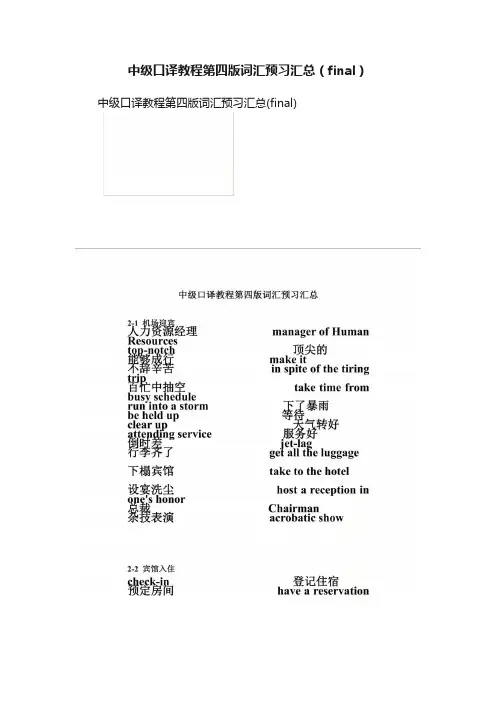
中级口译教程第四版词汇预习汇总(final)中级口译教程第四版词汇预习汇总(final)干杯cheers2-4 参观访问高科技园区High-T ech Park业务经理Operation Manager鸟瞰take a bird's-eye view of走马观花cast a passing glance at flowers while riding on horseback言归正传come back to our story项目审批权authorized to approve projects优惠政策preferential policies与国际管理体制接轨under the management system of international standards跨国公司multinationals骨干企业large enterprises of pillar industries生物技术biotechnology高技术产业链high-tech industry chains一条龙服务 a stream-line one-stop service生态型开发ecological conservation 可持续发展sustainable development绿草成茵stretches of green grass流水潺潺streams murmuring鸟儿啁啾birds chirping四季花香fragrant flowers blossoming all years round安保服务security service3-1 欢迎光临邮电post andtelecommunication海外部主任director of the Overseas Department感到骄傲和荣幸be proud and honoredgracious invitation 盛情邀请a distinguished group 一个杰出的团队寄托expectation外宾专用别墅villas for overseas visitorslook over the sea 面向大海幽默感sense of humor字面意思literal meaning下榻live, reside国际机票international flight ticketschool break 学校假期3-2 投资意向翻了两番quadruple投资热investment fever对外全面开放open the whole country up to the outside world 沿海城市coastal cities内地interior areas有利可图profitableI'm all ears to…愿闻其祥。
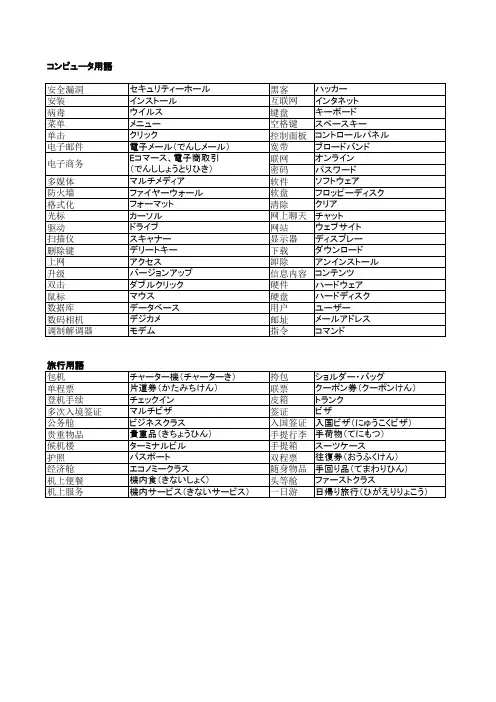

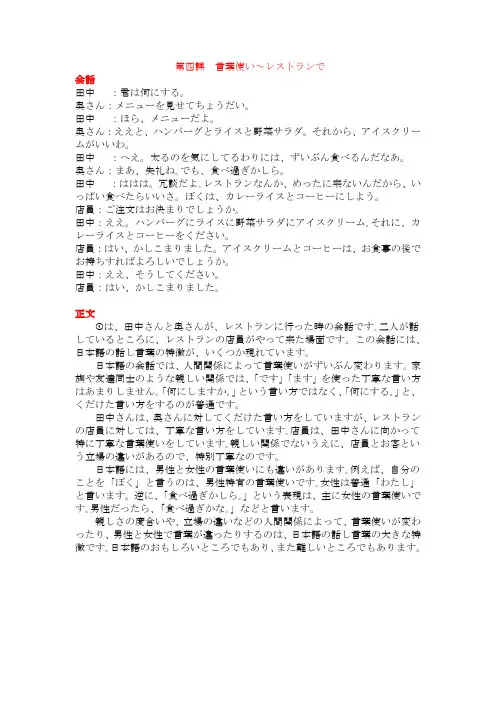
第四課言葉使い~レストランで会話田中:君は何にする。
奥さん:メニューを見せてちょうだい。
田中:ほら、メニューだよ。
奥さん:ええと、ハンバーグとライスと野菜サラダ。
それから、アイスクリームがいいわ。
田中:へえ。
太るのを気にしてるわりには、ずいぶん食べるんだなあ。
奥さん:まあ、失礼ね。でも、食べ過ぎかしら。
田中:ははは。
冗談だよ。レストランなんか、めったに来ないんだから、いっぱい食べたらいいさ。
ぼくは、カレーライスとコーヒーにしよう。
店員:ご注文はお決まりでしょうか。
田中:ええ。
ハンバーグにライスに野菜サラダにアイスクリーム。それに、カレーライスとコーヒーをください。
店員:はい、かしこまりました。
アイスクリームとコーヒーは、お食事の後でお持ちすればよろしいでしょうか。
田中:ええ、そうしてください。
店員:はい、かしこまりました。
正文は、田中さんと奥さんが、レストランに行った時の会話です。二人が話しているところに、レストランの店員がやって来た場面です。
この会話には、日本語の話し言葉の特徴が、いくつか現れています。
日本語の会話では、人間関係によって言葉使いがずいぶん変わります。
家族や友達同士のような親しい関係では、「です」「ます」を使った丁寧な言い方はあまりしません。「何にしますか。」という言い方ではなく、「何にする。」と、くだけた言い方をするのが普通です。
田中さんは、奥さんに対してくだけた言い方をしていますが、レストランの店員に対しては、丁寧な言い方をしています。店員は、田中さんに向かって特に丁寧な言葉使いをしています。親しい関係でないうえに、店員とお客という立場の違いがあるので、特別丁寧なのです。
日本語には、男性と女性の言葉使いにも違いがあります。例えば、自分のことを「ぼく」と言うのは、男性特有の言葉使いです。女性は普通「わたし」と言います。
逆に、「食べ過ぎかしら。」という表現は、主に女性の言葉使いです。男性だったら、「食べ過ぎかな。」などと言います。
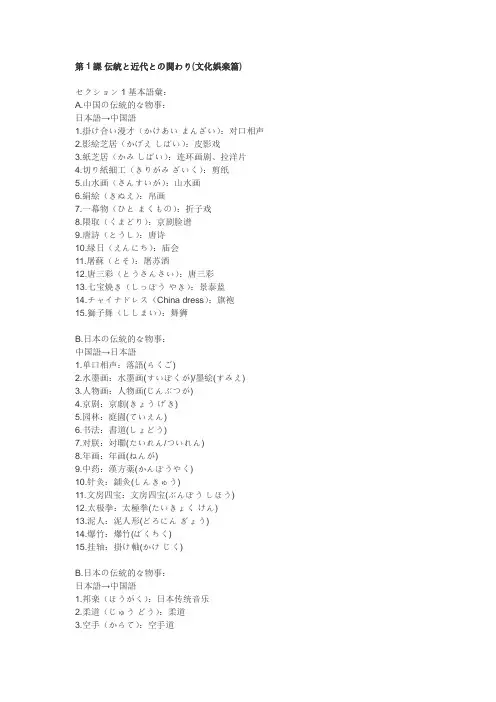
第1課伝統と近代との関わり(文化娯楽篇)セクション1基本語彙:A.中国の伝統的な物事:日本語→中国語1.掛け合い漫才(かけあいまんざい):对口相声2.影絵芝居(かげえしばい):皮影戏3.紙芝居(かみしばい):连环画剧、拉洋片4.切り紙細工(きりがみざいく):剪纸5.山水画(さんすいが):山水画6.絹絵(きぬえ):帛画7.一幕物(ひとまくもの):折子戏8.隈取(くまどり):京剧脸谱9.唐詩(とうし):唐诗10.縁日(えんにち):庙会11.屠蘇(とそ):屠苏酒12.唐三彩(とうさんさい):唐三彩13.七宝焼き(しっぽうやき):景泰蓝14.チャイナドレス(China dress):旗袍15.獅子舞(ししまい):舞狮B.日本の伝統的な物事:中国語→日本語1.单口相声:落語(らくご)2.水墨画:水墨画(すいぼくが)/墨絵(すみえ)3.人物画:人物画(じんぶつが)4.京剧:京劇(きょうげき)5.园林:庭園(ていえん)6.书法:書道(しょどう)7.对朕:対聯(たいれん/ついれん)8.年画:年画(ねんが)9.中药:漢方薬(かんぽうやく)10.针灸:鋪灸(しんきゅう)11.文房四宝:文房四宝(ぶんぼうしほう)12.太极拳:太極拳(たいきょくけん)13.泥人:泥人形(どろにんぎょう)14.爆竹:爆竹(ばくちく)15.挂轴:掛け軸(かけじく)B.日本の伝統的な物事:日本語→中国語1.邦楽(ほうがく):日本传统音乐2.柔道(じゅうどう):柔道3.空手(からて):空手道4.剣道(けんどう):剑术5.狂言(きょうげん):狂言6.浴衣(ゆかた):夏季穿的和服单衣7.冠婚葬祭(かんこんそうさい):婚丧喜事8.桜前線(さくらぜんせん):关于樱花开放的最新报道9.さび:古色古香;朴素优美10.わび:闲寂;恬静11.花火大会(はなびたいかい):烟火晚会12.紅白歌合戦(こうはくうたがっせん):红白歌会13.福袋(ふくぶくろ):满袋福14.初詣(はつもうで):新年后首次去神社参拜15.紅葉狩り(こうようかり):观赏红叶中国語→日本語1.相扑/大相扑:相撲(すもう)/大相撲(おおずもう)2.茶道:茶道(さどう)3.插花:生け花(いけばな)/花道(かどう)4.歌舞伎:歌舞伎(かぶき)5.能:能(のう)/能楽(のうがく)6.神社:神社(じんじゃ)7.招财猫:招き猫(まねきねこ)8.观赏樱花:花見(はなみ)9.灵前守夜:通夜(つうや)10.中元节:中元(ちゅうげん)11.歩末送礼:お歳暮(おせいぼ)12.和服:着物(きもの)13.温泉:温泉(おんせん)14.公共浴池:銭湯(せんとう)15.俳句:俳句(はいく)C.芸能関係:日本語→中国語1.アクション(Action)映画:动作片2.ギャング(Gangster)映画:警匪片3.ホラー(Horror)映画:恐怖片4.ミステリー(Mystery)映画:侦探片5.オカルト(Occult)映画:鬼怪片6.ドキュメンタリー(Documentary):纪录片7.映画監督(えいがかんとく):电影导演8.モンタージュ(Montage):蒙太奇9.エキストラ(Extra):临时演员10.吹き替え(ふきかえ):配音11.芸能(げいのう)プロ(Production)/プロダクション(Production):经纪公司12.ブルース(The blues):布鲁斯黑人音乐13.マニア(Mania):发烧友14.芸能人(げいのうじん)の追っかけ(おっかけ)ファン(Fan):追星族15.ラップ:说唱乐曲16.民謡(みんよう):民歌; 民谣17.子守歌(こもりうた):摇篮由18.レパートリー(Repertoire):经典剧目19.コメディアン(Comedian):笑星20.ライブコンサート(Live concert):现场演唱会中国語→日本語1.武打片:カンフー映画(えいが)2.愛情片:恋愛映画(れんあいえいが)3.科幻片:SF(Science fiction)(サイエンス?フィクション)映画4.西部片;牛仔片:西部劇(せいぶげさ)5.动画片:アニメーション/アニメ(Animation)6.电视连续剧:テレビドラマ(TV drama)7.歌剧:オペラ(Opera)8.芭蕾舞:バレエ(Ballet)9.歌舞剧:ミュージカル(Musical)10.卡拉OK:カラオケ(Karaoke)11.智力竞赛节目:クイズ(Quiz)番組(ばんぐみ)12.嘻哈族;街舞:ヒップホップ(Hip hop)13.剧照:スチール(Steel)写真(しゃしん)14.管弦乐团:オーケストラ(Orchestra)15.爵士乐:ジャズ(Jazz)16.摇滚乐:ロック(Rock)17.配音演員:声優(せいゅう)18.马戏;杂技:サーカス(Circus)19.主角:主役(しゅゃく)20.配角:脇役(わきゃく)D.文化と娯楽の関連用語:日本語→中国語1.デジタルシネマ(Digital Cinema):数码影院2.オーディション(Audition):各式各样的明星选拔比赛3.探検旅行(たんけんりょこう):探险旅游4.たまごっち:电子宠物5.個人(こじん)ツアー(Tour):个人境外游6.イメージキャラクター(Image character):形象代言人7.封切式(ふうきりしき):首映式8.お正月(しょうがつ)ロードショー(Road Show):贺岁片9.一次予選(いちじよせん):海选10.ハーリー(Hari中文拼音)族(ぞく):哈日族11.歌(うた)をリクエス卜(Request)する:点歌12.オールスター?キャスト(All-star cast):名角大会串13.大物歌手(おおものかしゅ):大腕歌星14.パパラっチ(Paparazzi)/追っかけ(おっかけ)カメラマン(Camera man):狗仔队15.新人王(しんじんおう):最佳新人奖中国語→日本語1.大众文化:大衆文化(たいしゅうぶんか)2.偶像:アイドル(Idol)3.攀岩:ロッククライミング(Rock-climbing)4.瑜伽:ヨガ(Yoga)5.有氧健身操:エアロビクス(Aerobics)6.夜市小吃:屋台(やたい)7.收視率:視聴率(しちょうりつ)8.数码相机:デジタルカメラ/デジカメ(Digital Camera)9.文人墨客:文人墨客(ぶんじんぼっきゃく)10.主題公園:テーマパーク(Theme Park)11.嘉年华,狂欢节,饮宴狂欢:カーニバル(Carnival)12.脱口秀:トークショー(Talk show)13.韩流:韓流(ハンリュウ)14.选美:美人(びじん)コンテスト(Contest)15.大牌明星:大物俳優(おおものはいゆう)E.相関機関と固有名称:日本語→中国語1.国際観光振興会(こくさいかんこうしんこうかい)(JNTO) :国家观光振兴会2.国際オリンピック(The Olympics)委員会(いいんかい)(IOC) :国际奥委会3.世界観光機関(せかいかんこうきかん)(WTO) :世界旅游组织4.ユネスコ(UNESCO) :联合国教科文组织5.ユニバーサルスタジオジャパン(Universal studio Japan)(USJ) :日本环球影城6.ユニバーシアード(Universiade)大会(たいかい):世界大学生运动会7.Jリーグ(League):日本职业足球联赛8.オスカー(Oscar)賞(しょう):奥斯卡奖9.ギネス(Guinness)記録(きろく):吉尼斯纪录10.ミッキーマウス(Mickey mouse):米老鼠11.ディズニーランド(Disneyland):迪斯尼乐园12.マヤ(Maya)文明(ぶんめい):玛雅文明13.ハリウッド(Hollywood):好莱坞14.ショパンピアノコンクール(Chopin piano contest):肖邦钢琴大赛15.ベニス(Venice)国際映画祭(こくさいえいがさい):威尼斯国际电影节16.カンヌ(Cannes)国際映画祭:嘎纳国际电影节17.ベルリン(Berlin)国際映画祭:柏林国际电影节18.ルネサンス(Renaissance):文艺复兴19.ピラミッド(Pyramid):金字塔20.ミイラ(Mirra<词源是myrrh n.[植]没药树, 没药(没药树的树胶脂) >木乃伊的英语为→Mummy):木乃伊第2課社会万華鏡(社会生活篇)単語セクション1基本語彙:A.中国社会に関する実用言葉(1):日本語:中国語1.改革開放(かいかくかいほう):改革开放2.西部大開発(せいぶだいかいはつ):西部大开发3.南巡講話(なんじゅんこうわ):南巡讲话4.一人っ子政策(ひとりっこせいさく):计划生育政策5.社会主義市場経済(しゃかいしゅぎしじょうけいざい):社会主义市场经济6.現代化プロセス(げんだいかProcess):现代化进程7.社会保障体系(しゃかいほしょうたいけい):社会保障体系8.マクロ?コントロール(Macro control):宏观调控9.法整備(ほうせいび):完善法律体系10.国営企業改革(こくえいきぎょうかいかく):国企改革11.有人宇宙船打ち上げ成功(ゆうじんうちゅうせんうちあげせいこう):成功发射载人飞船12.インフラ整備(Infrastructureせいび):城市基础设施建设13.科学技術振興キャンペーン(かがくぎじゅつしんこうCampaign):科技振兴运动14.中華骨髄バンク(ちゅうかこつずいBank):中华骨髓库15.三峡ダム工事(さんきょうDamこうじ):三峡工程中国語:日本語:1.北京奥运会:北京五輪(ペキンごりん)/北京のオリンピック?ゲーム(Peking Olympic Games)2.世博:万国博覧会(ばんこくはくらんかい)/万博(ばんぱく)/エキスポート(Export)3.合资企业:合弁企業(ごうべんきぎょう)4.日企:日系企業(にっけいきぎょう)5.国有企业:固有企業(こくゆうきぎょう)6.一国两制:一国二制度(いっこくにせいど)7.经济特区:経済特別区(けいざいとくべつく)8.廉政建设:クリーン(Clean)な政治制度の確立(クリーンなせいじせいどのかくりつ)9.反腐败:腐敗一掃キャンペーン(ふはいいっそうキャンペーン)/腐敗取り締まりキャンペーン(ふはいとりしまりキャンペーン)/腐敗退治(ふはいたいじ)10.和谐社会:調和の取れた社会(ちょうわのとれたしゃかい)11.机制改革:行政改革(ぎょうせいかいかく)12.自主创新:自力革新(じりきかくしん)13.房地产热:不動産ブーム(Boom)(ふどうさんブーム)14.收入差距:収入格差(しゅうにゅうかくさ)15.下岗:自宅待機(じたくたいき)/レーオフ(lay off)/一時休職(いちじきゅうしょく)B.中国社会に関する実用言葉(2):日本語:中国語1.貧困救済事業(ひんこんきゅうさいじぎょう):扶贫帮困2.第11次5ヵ年規画(だい11じ5ヵねんきが):第11个5年规划3.ややゆとりのある社会(しゃかい):小康社会4.知的財産立国(ちてきざいさんりっこく):科教兴国5.教育立国(きょういくりっこく):教育兴国6.マスコット(Mascot):吉祥物7.外来人口(がいらいじんこう):外来人口8.戸籍人口(こせきじんこう):常住人口9.国勢調査(こくせいちょうさ):全国人口普查10.在宅養老(ざいたくようろう):居家养老11.最低賃金(さいていちんぎん):最低工资12.規制緩和(きせいかんわ):放宽限制13.副食品供給プロジェクト(ふくしょくひんきょうきゅうProject):菜篮子工程14.希望プロジェクト(きぼうProject):希望工程15.住環境改善プロジェクト(じゅうかんきょうかいぜんProject):安居工程中国語:日本語:1.同一个世界,同一个梦:一つの世界(せかい)、一つの夢(ゆめ)2.综合国力:総合的国力(そうごうてきこくりょく)3.技术革新:技術革新(ぎじゅつかくしん)4.协调发展:バランスのとれた発展(Balanceのとれたはってん)5.社区服务:コミュニティ?サービス(Community service)6.整体规划:マスター?プラン(Master plan)7.法律制约:法的規制(ほうてきさせい)8.民族复兴:民族復興(みんぞくふっこう)9.脱贫致富:貧困(ひんこん)から脱却(だっきゃく)し、豊(ゆたか)になる10.廉价房:安価な住宅(あんかなじゅうたく)11.机制:メカニズム(Mechanism)12.股民:個人株式投資家(こじんかぶしさとうしか)13.民工:出稼ぎ労働者(でかせぎろうどうしゃ)14.打假:偽物懲罰運動(にせものちょうばつうんどう)15.裁军:軍縮(ぐんしゅく)C.日本社会に関する実用言葉:日本語:中国語:1.特別養護老人ホーム(とくべつようごろうじんhome):特别护理老人院2.介護問題(かいごもんだい):护理老人问题3.ニート(Neet):袋鼠族,啃老族“NEET group”指啃老族群体。
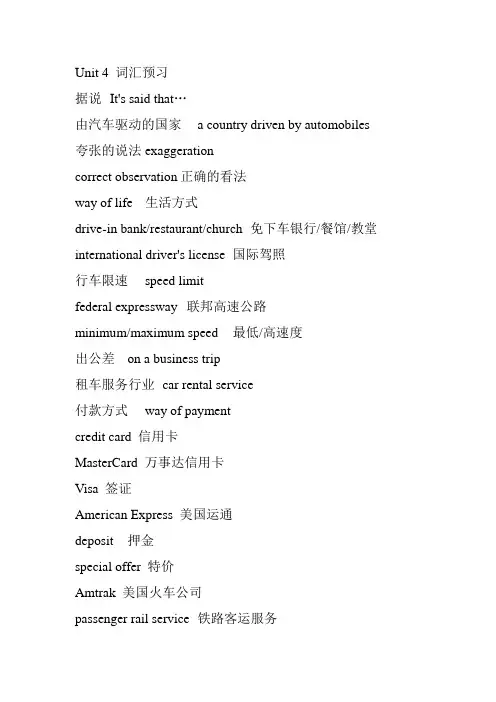
Unit 4 词汇预习据说It's said that…由汽车驱动的国家 a country driven by automobiles 夸张的说法 exaggerationcorrect observation 正确的看法way of life 生活方式drive-in bank/restaurant/church 免下车银行/餐馆/教堂international driver's license 国际驾照行车限速speed limitfederal expressway 联邦高速公路minimum/maximum speed 最低/高速度出公差on a business trip租车服务行业car rental service付款方式way of paymentcredit card 信用卡MasterCard 万事达信用卡Visa 签证American Express 美国运通deposit 押金special offer 特价Amtrak 美国火车公司passenger rail service 铁路客运服务Greyhound 黑狗long distance coach 长途汽车monthly pass 月票regulate price 规定的票价lower rates 更低利率shuttle/ commuter flights 穿梭于两地之间的航班不尽如人意 undesirablesubway 地铁cab/cabby 出租车Yellow Pages 黄页Telephone directory 电话簿4-3business communication style 商务沟通模式work ethic 工作理念,工作观念counterpart职务相当的人prospective business contact 未来的生意伙伴the"get-down-to-business-first"mentality “公务为先”的心态time-consuming 耗时的keep to 遵循the "bottom-up, then top-down and then bottom-up" principle “先自下而上,然后自上而下,然后再自下而上”的原则top management 最高层管理人士business practice 商务活动咄咄逼人的 aggressivestraightforward 直截了当管理模式type of managementefficiency 效率give priority to 优先frustrate 打击,挫败fulfillment 完成,成就membership 会员身份,资格a sense of belonging in a community 团体归属感individual oriented 个人倾向的,个体取向的accomplishment 成果,成就dedication 奉献利与弊merits and demerits/ advantages and disadvantages the Oriental way of management 东方的管理模式humane 人道的。
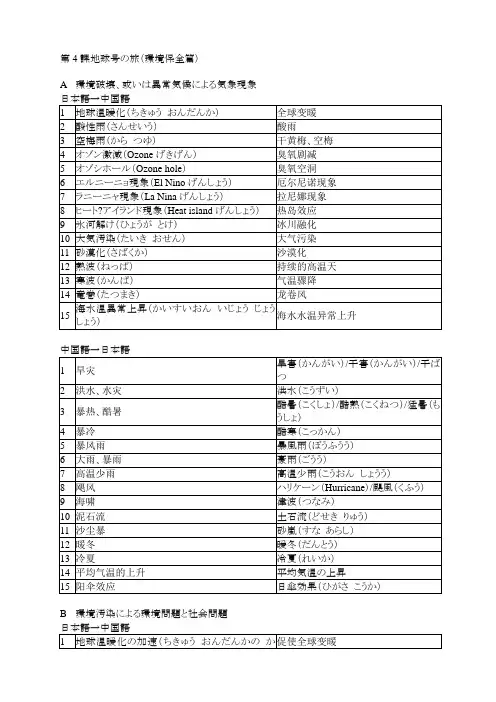
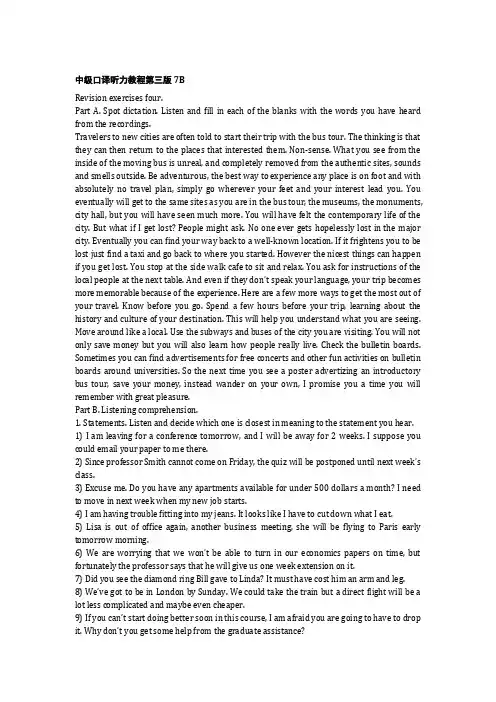
中级口译听力教程第三版7BRevision exercises four.Part A. Spot dictation. Listen and fill in each of the blanks with the words you have heard from the recordings.Travelers to new cities are often told to start their trip with the bus tour. The thinking is that they can then return to the places that interested them. Non-sense. What you see from the inside of the moving bus is unreal, and completely removed from the authentic sites, sounds and smells outside. Be adventurous, the best way to experience any place is on foot and with absolutely no travel plan, simply go wherever your feet and your interest lead you. You eventually will get to the same sites as you are in the bus tour, the museums, the monuments, city hall, but you will have seen much more. You will have felt the contemporary life of the city. But what if I get lost? People might ask. No one ever gets hopelessly lost in the major city. Eventually you can find your way back to a well-known location. If it frightens you to be lost just find a taxi and go back to where you started. However the nicest things can happen if you get lost. You stop at the side walk cafe to sit and relax. You ask for instructions of the local people at the next table. And even if they don’t speak your language, your trip becomes more memorable because of the experience. Here are a few more ways to get the most out of your travel. Know before you go. Spend a few hours before your trip, learning about the history and culture of your destination. This will help you understand what you are seeing. Move around like a local. Use the subways and buses of the city you are visiting. You will not only save money but you will also learn how people really live. Check the bulletin boards. Sometimes you can find advertisements for free concerts and other fun activities on bulletin boards around universities. So the next time you see a poster advertizing an introductory bus tour, save your money, instead wander on your own, I promise you a time you will remember with great pleasure.Part B. Listening comprehension.1. Statements. Listen and decide which one is closest in meaning to the statement you hear.1) I am leaving for a conference tomorrow, and I will be away for 2 weeks. I suppose you could email your paper to me there.2) Since professor Smith cannot come on Friday, the quiz will be postponed until next week’s class.3) Excuse me. Do you have any apartments available for under 500 dollars a month? I need to move in next week when my new job starts.4) I am having trouble fitting into my jeans. It looks like I have to cut down what I eat.5) Lisa is out of office again, another business meeting, she will be flying to Paris early tomorrow morning.6) We are worrying that we won’t be able to turn in our economics papers on time, but fortunately the professor says that he will give us one week extension on it.7) Did you see the diamond ring Bill gave to Linda? It must have cost him an arm and leg.8) We’ve got to be in London by Sunday. We could take the train but a direct flight will be a lot less complicated and maybe even cheaper.9) If you can’t start doing better soon in this course, I am afraid you are going to have to drop it. Why don’t you get some help from the graduate assistance?10) I am sure wish I had a metric ruler with me, I need the measurements in millimeters, not in inches, and I am tired of converting.2. Talks and conversations. Listen and choose the best answer to each question you hear. Questions 11 to 14 are based on the following conversation.M: I really appreciate your filling me in on yesterday’s lecture.W: No problem. I thought you might want to go over it together, and anyway it helps me review. Hope you are feeling better now.M: I am, thanks. So you said she talked about squid, sounds a little strange.W: Well, actually it was about the evolution of sea life, a continuation from last week. The octopus and squid descended from earlier creatures with shells, they survived by shedding their shells somewhere between 200 and 500 million years ago.M: That’s a pretty long span of time.W: I know. That was what she said though, to be precise, exactly when they emerge is uncertain, and why is still unexplained.M: Some squid are really huge. Can you imagine something that big is still had a shell?W: Actually it’s because they lost their shell that they could evolve to a bigger size.M: Make sense. But some are really huge. I have read about fisherman that caught squid that weighed over a ton. Did she talk about how that happens?W: Not really. But she did mention some usual cases. In 1933 in New Zealand, they caught a squid, it was 22 yards long, its eyes were 18 inches across. Can you imagine?M: Reminds me of all those stories of sea monsters.W: Dr. Simpsons thinks that there are probably even larger ones that haven’t been found, because squid are intelligent and fast, so they can easily get away from humans. Maybe some of those monster stories are true.Questions:11) What topic are the man and woman discussing?12) Why does the man need to talk to the woman about the class?13) According to the woman what happened 200 to 500 million years ago?14) What does the woman imply about the sea monsters?Questions 15 to 20 are based on the following conversation.M: So Andria, you are going home for the holidays?W: I sure am. I booked the flight for tomorrow afternoon. And I can’t wait.M: That sounds great.W: What about you? Going home too?M: I haven’t decided yet. I am still debating.W: Haven’t decided? Oh, you are never going to get a flight out of here. I am sure all the seats have been reserved by now. It’s the holiday season after all.M: Well, it’s not such a big deal for me. My family o nly lives about a hundred and fifty miles from here. I usually drive or take the train. It’s a short trip.W: You don’t sound very excited about it.M: Well, we are not really a very close knit family. I have 3 brothers and they are spread out all over the place. One lives on the east coast, and the other on the west coast. I even have a brother in Montreal.W: Oh, wow! What does he do?M: Translation work. It’s kind of strange, but we rarely get together as a family any more. W: Well, I tried to get home as much as possible. We are a big family. There are 6 of us children. So it’s always a lot of fun.M: Six kids?W: Yep, and we are all really close. You should see it. Most of us are married too. So it makes it a very crowded house for the holidays.M: I can imagine.W: Because there are too many people to cook dinner for, it’s a real headache for my parents. So we end up going out to dinner a lot. It’s pretty crazy.M: Well, at my house my mother loves to cook. So when all of us do get home, which isn’t that often, she always cooks big home made meals. We have left-overs for days. Questions:15) Who is going home for the holidays?16) When is the woman leaving for home?17) Why have all the seats been reserved by now according to the woman?18) Where does the man’s family live?19) How many children are there in the woman’s family?20) Which of the following statement is true according to the conversation?Questions 21 to 24 are based on the following conversation.M: Oh, I just got some bad news today.W: What happened, Tony?M: Well, you know my job is at the design studio.W: Yes?M: Well …W: Oh, no.M: Oh, yes. Today the boss called me into his office and told me that they had to lay me off indefinitely. That means as of April 30th, I am out of work.W: Oh!M: No more job.W: Tony, I am so sorry. You really liked working there.M: Yeah, well, that’s not all bad news. There is still a small chance that the company will call me back in the summer if the work picks up. You never know what will happen. They may still need me then.W: Oh, this is so sudden, isn’t it?M: Well, sort of. Two other employees lost their jobs last month and I had a feeling I might be the next one in line. You know I have only been working there 10 months, so I don’t have any seniority. And if it is going to lay someone off, it’s always going to be the newer employees first.W: What are you going to do?M: Like I said I still got a job until the end of the month. Starting in May, I plan to send out resumes and go on some interviews. Depending on the outcome of the interviews. Questions:21) What’s the bad news for Tony?22) How long has Tony been working at his present job?23) According to the conversation which of the following statements is not true?24) What might be one reason for Tony to be laid off ahead of many other employees? Questions 25 to 30 are based on the following talk.Andrew Warhol was born in 1928 in Pittsburgh Pennsylvania. He studied at the Carnegie Institute of Technology. By 1950, Andy Warhol, as he now called himself, moved to New York city, and pursued a successful career as a commercial designer and illustrator. In the 1960s, Warhol became one of the leaders of the pop art movement. Taking its name from popular this art used images in popular culture for its subject matter. Probably one of Warhol’s most famous images is called Campbell Soup Can, a picture of a brand of soup popular in the US. Other famous works are Green Coca-Cola Bottles, and the three dimensional Brilow Box, which looks exactly like the boxes of soup pads sold in the supermarket. Now Warhol also wanted to simplify the process of making art. So he silks green photographs onto painted canvass. He created very striking, brightly colored portraits of celebrities. The most famous are of Marilyn Monroe, Elizabeth Taylor, and Elvis Presley. To make his art look even more mechanical, he would repeat many images of the same thing on the canvass, sometimes just changing the color or a few little details. He even named the place where he produced his art The Factory. And Warhol was also a film maker and a publisher. His magazine called Interview was filled with articles and gossip about celebrities. With his trade mark bushy white hair and his association with celebrities this man who seemed somewhat shy was always in the public eye. It seems that the more fun he made of art and fame the more famous Andy Warhol became. He died in 1987 and it is the subject of the largest museum devoted to a single artist, the Andy Warhol Museum in Pittsburgh his hometown.Questions:25) This talk is about the American artist Andy Warhol. When was this artist born?26) Which of the following were used for the subject matter of pop art?27) Andy Warhol created brightly colored portraits of celebrities, which of the following is not one of these famous people?28) Why did Andy Warhol name his work place The Factory?29) Apart from a commercial designer Andy Warhol worked at several other jobs, which of the following is not one of these jobs?30) Which of the following makes Andy Warhol unique as an artist?Part C. Listening and translation.1. Sentence translation. Listen and translate each sentence you have heard into Chinese. Then write it in the space given below.1) In summary, we can see that every business no matter how large or small depends on advertizing to attract and keep customers.2) Figures out today showed that retail sales last year were worse than expected. Sales actually dropped 13 percent.3) The majority of people I know are concerned about the worsening pollution in the city. It is doing great harm to the air and water.4) Air travel became more dangerous in the past 20 years, because of terrorism which is why stricter airport’s security rules were put into effe ct.5) People today watch TV more than they buy books, which is why they understand visualinformation far better than written information.2. Passage translation. Listen and translate each passage you have heard into Chinese. Then write it in the space given below. You may take notes while you are listening.1) Recent government figures indicate that our standard of living is rising, but they don’t take into account important factors like pollution, crime, and stress. In the past wages were much lower, but then people could go out without constantly having to look over their shoulder, and moms could send their kids to play in the streets without worrying they would be attacked or offered drugs by someone. So many people agree that the quality of life in Britain has definitely deteriorated. Crime is on the increase, and hundreds of homeless teenagers roam the streets.2) On July 16th, my friends and I arrived at your inn, hoping to spend an enjoyable weekend. Unfortunately because of your poor service our weekend was a disaster. Since your ad says have a fabulous time or we will get your money back, I am requesting that you refund our money. The room had not yet been cleaned, so we found dirty towels on the beds and cigarette buds in the ashtrays. Despite these problems none of your employees apologized to us. This was not the weekend we had been looking forward to.Revision exercises 41.in summary2.retail sales 零售额be worse than expected 比预期的差3.be concerned about the worsening pollution in this city 对这座城市恶化的污染问题担忧It is doing great harm to the air and water 污染正破环着空气和水4.Air travel became more dangerous in the past twenty years because ofterrorism, which is why stricter airport security rules were put into effect.在过去的20年里,乘飞机旅行因为恐怖活动而变得更加危险,这正是实施更严格的机场安全规则的原因。
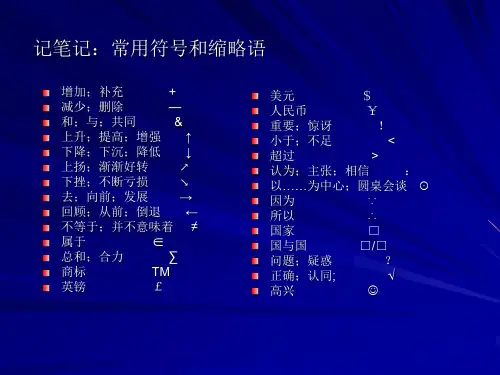
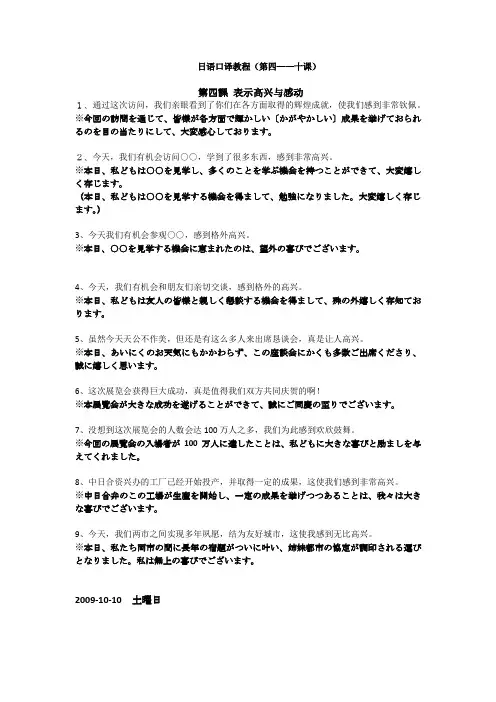
日语口译教程(第四——十课)第四課表示高兴与感动1、通过这次访问,我们亲眼看到了你们在各方面取得的辉煌成就,使我们感到非常钦佩。
※今回の訪問を通じて、皆様が各方面で輝かしい〔かがやかしい〕成果を挙げておられるのを目の当たりにして、大変感心しております。
2、今天,我们有机会访问○○,学到了很多东西,感到非常高兴。
※本日、私どもは○○を見学し、多くのことを学ぶ機会を持つことができて、大変嬉しく存じます。
(本日、私どもは○○を見学する機会を得まして、勉強になりました。
大変嬉しく存じます。
)3、今天我们有机会参观○○,感到格外高兴。
※本日、○○を見学する機会に恵まれたのは、望外の喜びでございます。
4、今天,我们有机会和朋友们亲切交谈,感到格外的高兴。
※本日、私どもは友人の皆様と親しく懇談する機会を得まして、殊の外嬉しく存知ております。
5、虽然今天天公不作美,但还是有这么多人来出席恳谈会,真是让人高兴。
※本日、あいにくのお天気にもかかわらず、この座談会にかくも多数ご出席くださり、誠に嬉しく思います。
6、这次展览会获得巨大成功,真是值得我们双方共同庆贺的啊!※本展覧会が大きな成功を遂げることができて、誠にご同慶の至りでございます。
7、没想到这次展览会的人数会达100万人之多,我们为此感到欢欣鼓舞。
※今回の展覧会の入場者が100万人に達したことは、私どもに大きな喜びと励ましを与えてくれました。
8、中日合资兴办的工厂已经开始投产,并取得一定的成果,这使我们感到非常高兴。
※中日合弁のこの工場が生産を開始し、一定の成果を挙げつつあることは、我々は大きな喜びでございます。
9、今天,我们两市之间实现多年夙愿,结为友好城市,这使我感到无比高兴。
※本日、私たち両市の間に長年の宿題がついに叶い、姉妹都市の協定が調印される運びとなりました。
私は無上の喜びでございます。
2009-10-10 土曜日第五课表达印象1、在车间和研究所里,可以看到职工和研究人员为提高产品质量以及改进技术而努力工作的情景,给我们流下了深刻的印象。
中级口译教程-4-4-音乐天才-整理译文4-4 音乐天才A Gifted MusicianQ: 海伦,你对媒体有什么忌讳吗?Q: Helen, is there anything that you wish the media wouldn’t ask you?A: 没什么忌讳的。
我喜欢新闻记者的提问,因为只要记者问有题要问我,那就说明我还干得不错。
A: No, I like inquiries from the press people, because as long as they are asking quest ions, I’mdoing okay.Q: 你把自己的首张专辑献给你的母亲,请问她对你的艺术生涯产生了什么样的影响?Q: You dedicated your debut album to your mom. In what way did she impact your a rt career?A: 我的母亲是一位歌唱家,也是我的挚友。
我很崇拜她。
她非常了不起,在很多方面都非常优秀,在精神和音乐两方面都很出色。
A: She was a vocalist and one of my best friends. I adored her. She was a tremendous induividual in so many ways, spiritual and musical in particular.Q: 你在歌曲创作方面有没有一种不同寻常的写作方式?Q: Do you have a particular method for songwriting?A: 嗯,我不知道有没有特殊的歌曲作词方法。
我先作曲。
先思考一下歌曲的旋律,然后再看看有没有灵感,歌词会不会冒出来。
一般而言,旋律出不来,十之八九歌词也不会出来。
A: Well, I don’t know if I have. I start with the music. I try to be melodic first and I go ahead and see if the words will come. Generally, if the music isn’t happening, nine out of ten times thewords aren’t happening.Q: 你的专辑有没有中心思想?Q: Is there any common message in the album?A: 我不知道有没有中心思想,我觉得这张专辑讲的是真诚,这是我自己的一种感悟。
中级第1课(课文)【本课讲解步骤】本课内容:单词、课文。
课程讲解:主要语法和句型。
【本课内容】単語:ちょっと【副】哎,劳驾;有点,稍微;有点儿~,不太~おじさん【名】大爷,大叔;伯伯,叔叔,舅舅おねえさん(お姉さん)【名】姐姐じどうドア(自動ドア)【名】自动门めざましどけい(目覚まし時計)【名】闹钟おとうさん(お父さん)【名】父亲,爸爸ふしぎ(不思議)【形2】不可思议えきべん(駅弁)【名】车站卖的盒饭あめ【名】糖なめる【动2】舔,含ちゅうがっこう(中学校)【名】初级中学,初中テスト【名】考试,测验,测试なみだ(涙)【名】眼泪,泪しゅと(首都)【名】首都きゅうきゅうしゃ(救急車)【名】急救车,救护车ふた【名】盖子,盖ひろげる(広げる)【动2】展开,扩大,扩展わく(沸く)【动1】沸腾,烧开わかす(沸かす)【动1】烧熟,烧开タオル【名】毛巾かわかす(乾かす)【动1】弄干,晾干シャンハイほけん(上海保険)【专】上海保险公司おおかわ(大川)【专】大川スペインたいしかん(スペイン大使館)【专】西班牙大使馆シャンハイコンス(上海公司)【专】上海公司アフリカ【专】非洲ながさき(長崎)【专】长崎ぼくじょう(牧場)【名】牧场あたり(辺り)【名】周围,附近してつ(私鉄)【名】私营铁路こうえい(公営)【名】公营ジャパンレールウエイズ(JapanRailways)【专】日本铁路りゃく(略)【名】略,简略こくえい(国営)【名】国营みんえい(民営)【名】民营ろせん(路線)【名】线路しゅよう(主要)【形2】主要とし(都市)【名】都市,城市じそく(時速)【名】时速とうかいどう(東海道)【专】东海道さんよう(山陽)【专】山阳とうほく(東北)【专】东北きゅうしゅう(九州)【专】九州のびる(延びる)【动2】延伸,延长みんかん(民間)【名】民间けいえいする(経営する)【动3】经营また【连】另外,又,再,也ちほうじちたい(地方自治体)【名】地方自治团体じつよう(実用)【名】实用うんこう(運行)【名】运行ほうこう(方向)【名】方向あらわす(表す)【动1】表示,表现,表达のぼり(上り)【名】上,上行くだり(下り)【名】下,下行ほんしゅう(本州)【专】本州ちほう(地方)【名】地方ほうめん(方面)【名】方向,方面こんな【连体】这样的なぞなぞ【名】谜语こたえ(答え)【名】回答,答案~種類~~~化~化~的~的大~大~各~各~课文:日本の鉄道日本には、JR、私鉄、公営の3種類の鉄道会社があります。
時代とともに複雑・多様化する日本人の名前日本人は両親のいずれかから姓を受け続くが、名前は両親や家族によって命名されるのが一般的だ。
例えば、「鈴木玲子」は、「鈴木」が姓で、「玲子」が名前である。
名前に漢字名を持つ人が大半だが、制約があるわけではなく、特に女児じょじは平仮名やカタカナで命名されることもある。
時代の変遷へんせんとともに命名の傾向けいこうも変化している。
最近では社会情勢を反映はんえいし、活躍かつやく中のスポーツ選手、話題を呼んだタレントやドラマの役名にちなんだ名前も多い。
男児の名前の変遷を追ってみると、現在に比べて兄弟数の多かった昭和中期(1960年)ごろまでは、誕生順に漢数字を組み込んだ「健一」「雄二」など、あるいは「誠」「剛」のような漢字一文字で質実剛健しつじつごうけんな印象を表す名前が多かった。
その後、「直樹」「健太」など、まっすぐで健康であることを願った名前が流行し、最近では、「大輝だいき」「翔」「陸」など、大らかさや自然を連想される名前が見られる。
また生まれ年によっては、「駿しゅん」「竜也たつや」など干支えとにちなんだ名前が人気を呼ぶこともある。
女児は、昭和中期まで「幸子さちこ」「和子かずこ」など、圧倒的に「子」で終わる名前が多かったが、1980年代半ばにはそれらは名前ランキングから姿を消すとともに、「愛」「恵めぐみ」「彩あや」「香織かおり」「真由美まゆみ」などバリエーションが豊かになってきた。
ちなみに、昭和におけるプリンセスストーリーである皇太子こうたいし(現・天皇)成婚以降は、皇太子妃こうたいしひにあやかり「美智子」という名前が流行した。
最新の調査では、「美咲みさき」「さくら」「凛りん」といった優しさやかわいらしさ、花にまつわる名称めいしょう、そして和風わふうな響きの名前も人気だ。
「ひろみ」「かおる」などは、男女ともに使われ、性別の分かりにくい名前である。
ほかにも文字だけでは判別の付きにくい名前がいくつかある。